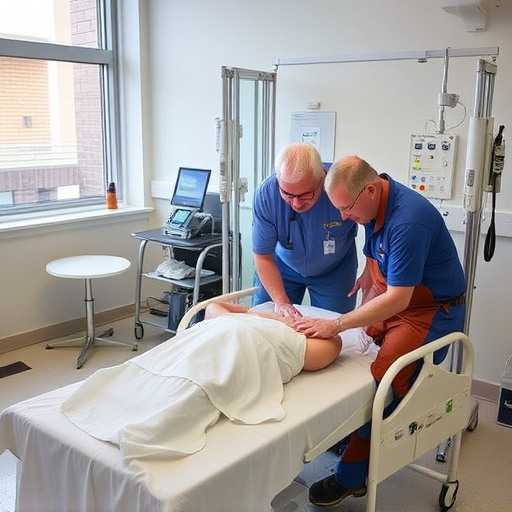Repetitive Strain Injury (RSI) affects millions globally, stemming from repetitive tasks and poor posture. Occupational Therapy offers a holistic solution, addressing physical symptoms and lifestyle factors. OT practitioners use ergonomic changes, exercise regimens, and therapies like shockwave treatment to reduce strain, strengthen muscles, and improve recovery from conditions like herniated discs. The ultimate goal is to facilitate immediate relief and prevent future RSI through education on posture, movement, and work habits.
Repetitive Strain Injury (RSI) is a growing concern in modern society, affecting individuals across various occupations. This article explores the critical role of occupational therapy in managing and treating RSI. We delve into the causes and symptoms of this condition, highlighting the comprehensive approach offered by occupational therapists. Through evidence-based interventions, we uncover effective strategies for RSI management, providing a roadmap to recovery for those suffering from this debilitating injury.
- Understanding Repetitive Strain Injury: Causes and Symptoms
- Occupational Therapy: A Comprehensive Approach to Treatment
- Evidence-Based Interventions for RSI Management and Recovery
Understanding Repetitive Strain Injury: Causes and Symptoms

Repetitive Strain Injury (RSI) is a common condition affecting millions worldwide, particularly among individuals with occupations involving repetitive tasks and prolonged periods in one position. It’s characterized by discomfort or pain in the arms, hands, wrists, shoulders, or neck, often arising from overuse or incorrect use of muscles and tissues. Over time, this can lead to chronic pain relief becoming a significant concern for affected individuals.
The primary causes of RSI include repetitive movements, poor posture, incorrect work station setup, and excessive force applied during tasks. Symptoms vary but may include persistent pain, numbness, tingling, or weakness in the affected areas. Additionally, muscle fatigue, tenderness, and reduced range of motion are common. For those suffering from musculoskeletal injuries or soft tissue injuries, RSI can significantly impact daily activities and quality of life.
Occupational Therapy: A Comprehensive Approach to Treatment

Occupational Therapy (OT) offers a comprehensive approach to managing and treating Repetitive Strain Injury (RSI), focusing on the patient’s overall well-being and ability to engage in daily activities. OT practitioners understand that RSI isn’t just about physical symptoms; it impacts an individual’s work, leisure, and social life. Therefore, their treatment strategies extend beyond pain management.
Through a multi-faceted approach, OT can address the root causes of RSI. This may involve modifying work environments to reduce strain, teaching ergonomic principles, and developing customized exercises to strengthen muscles and improve posture. Additionally, OT can explore alternative treatments like shockwave therapy for conditions like a herniated disc or whiplash, offering non-invasive options to alleviate pain and speed up recovery.
Evidence-Based Interventions for RSI Management and Recovery

Occupational therapists play a pivotal role in managing and treating repetitive strain injury (RSI) through evidence-based interventions. These strategies are designed to reduce pain, improve function, and enhance overall well-being. One of the key approaches involves personalized treatment plans tailored to the individual’s specific needs and activities. By assessing the underlying causes of RSI, therapists can develop customized programs incorporating exercises for strengthening and flexibility, ergonomic modifications, and stress management techniques.
Additionally, techniques such as manual therapy, therapeutic modalities (like heat or cold therapy), and education on proper body mechanics contribute significantly to RSI care. Many evidence-based practices also emphasize headache relief and neck pain relief, common symptoms associated with repetitive strain injury. These comprehensive interventions not only aid in the immediate recovery process but also empower individuals to prevent future occurrences of RSI through improved posture, movement patterns, and work habits.
Occupational therapy plays a pivotal role in managing and recovering from repetitive strain injury (RSI) by offering comprehensive, evidence-based interventions. By understanding the root causes and symptoms of RSI, occupational therapists develop personalized treatment plans that not only alleviate pain but also enhance functional abilities and work performance. Through various techniques, these professionals enable individuals to navigate their daily routines and professional demands with reduced risk of strain, fostering a healthier and more sustainable lifestyle.














